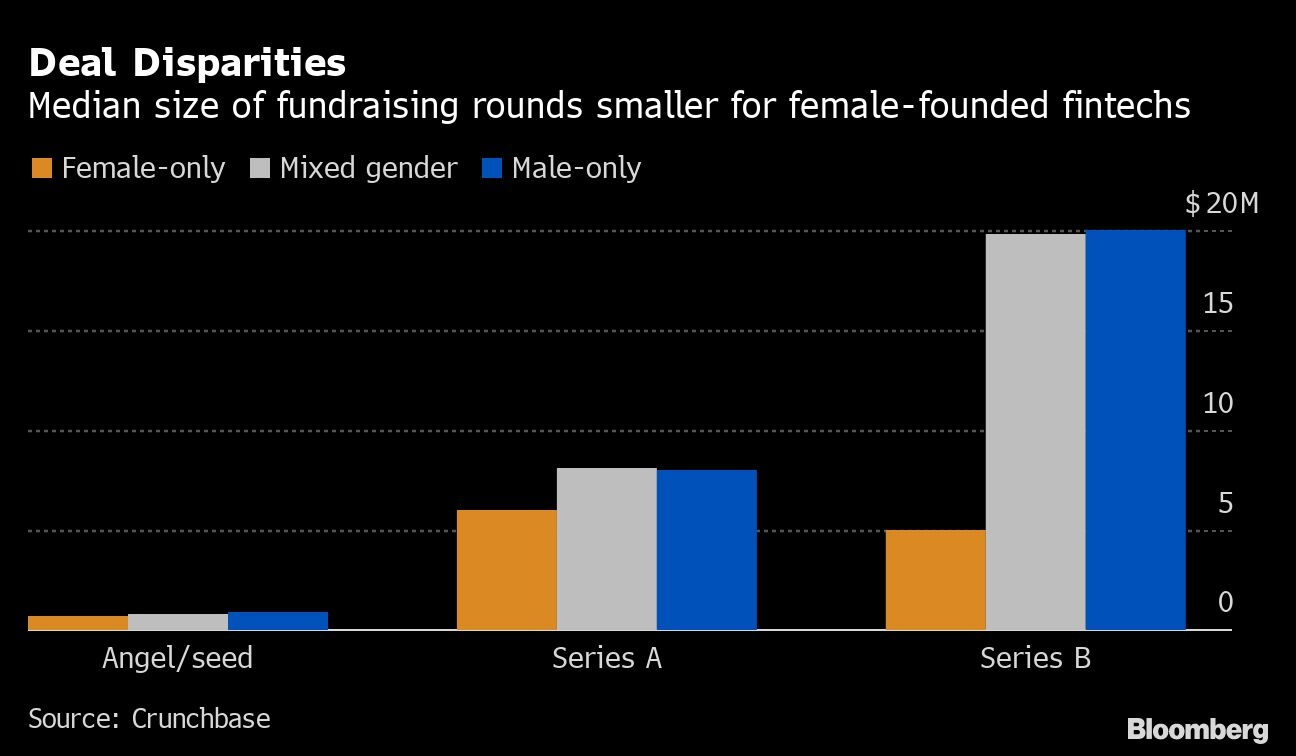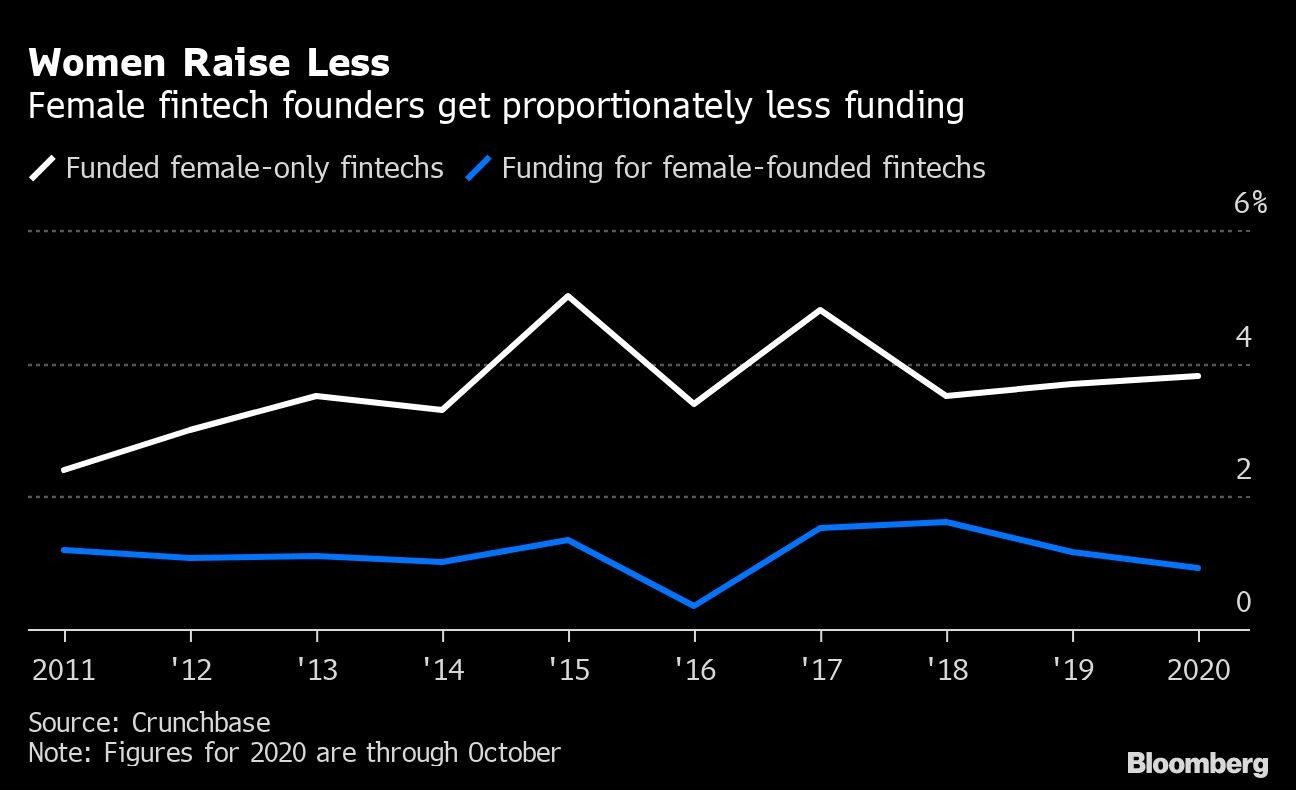Nov 25, 2020
Female founders lose out on money piling into fintechs
, Bloomberg News

As a record amount of venture capital flows into the fintech industry, female entrepreneurs are lagging behind their male counterparts in attracting funding.
Firms with only female founders accounted for 3.8 per cent of fintechs that attracted capital this year through October in the U.S., but drew proportionately less funding -- just 0.9 per cent of the total money raised by such companies, according to Crunchbase Inc., which tracks data on startups.
With financial-technology firms raising a record US$16.9 billion in the first three quarters of 2020 -- up 20 per cent from a year earlier, according to Crunchbase -- companies with female founders are losing out on opportunities to develop products and attract customers even as firms started by men are able to ramp up. Fintechs founded by women continue to face bias that’s difficult to overcome, said Alaina Sparks, a managing director and the U.S. fintech practice leader at consulting firm Deloitte.
“We’re operating at this intersection of finance and technology, which are both industries that are woefully underrepresented by women in the first place,” Sparks said.

Fintechs with both male and female founders accounted for almost 11 per cent of firms luring capital, but received 6.9 per cent of total funding, according to Crunchbase. The share of funding for fintechs founded by women and a mix of men and women has dipped after peaking in 2017 and 2018 as they raised fewer large-dollar rounds in the past two years.
“The percentage of the pool for male founders is already big, so we continue to see more dollars going there as those rounds expand,” said Katie Palencsar, head of the Female Innovators Lab, a New York-based program run by venture firm Anthemis Group SA and Barclays Plc that supports women in fintech.
During the coronavirus pandemic, many venture capitalists have doubled down on their portfolios, providing additional support to companies they’ve already invested in, Palencsar said. Given that the majority of those firms were founded by men, “you kind of have a vicious cycle right there where that capital may have gone to female founders or diverse founders or just more founders outside that traditional portfolio mix,” she said.
Female founders trail their male counterparts in raising money across venture-backed companies in general, but the gap is particularly stark in fintech. Disparities persist at early stages of funding as well. Over the past five years, median deal sizes for female-founded fintechs at seed, series A and series B stages were smaller than those for fintechs with male or mixed-gender founders, according to Crunchbase.

Tanya Van Court, founder of Goalsetter, an expense-management and financial-education app for kids, said she was repeatedly turned away from investors when she began raising pre-seed funding in 2016. They told her that her idea wasn’t “VC-backable,” or to come back to them after she had more “traction.” Months later, however, the same investors invested in male-founded companies also building financial apps for kids, Van Court said.
“For men, it seems like funding is based on their promise,” she said. “For women, it’s based on proof.”
Van Court ultimately secured funding from Pipeline Angels, a network of female angel investors across the U.S. committed to backing entrepreneurial women, along with other angel groups and accelerator programs. Still, she said, a competitor raised more in seed funding than she had in four years of operation.
Capital Needed
The implications can be wide-reaching, with fintechs requiring capital to partner with financial institutions and set up compliance systems. Van Court said that Goalsetter customers wanted access to a debit card, but the bank she approached wouldn’t partner with her firm until she secured at least $5 million in funding. Two years later, and still without the $5 million, she was able to add the option after hiring a head of banking operations who came from the payments industry and was able to capitalize on past relationships.
Tess Michaels, founder of Stride Funding Inc., which raises money from investors to provide education funding to students, said her company invested heavily in compliance up front. Stride issues income-share agreements -- contracts requiring students to repay tuition costs from their future salaries -- so the company needed to ensure it set up proper frameworks for its contracts and pricing, Michaels said.
“For a company that’s not able to raise funding in this space, it is very challenging to be able to even set up the right frameworks,” she said. “That is not the case for a lot of other industries that are clearly a bit lower on the barriers to entry.”
Serving Customers
Supporting female-led fintechs could also help the industry better serve consumers -- both men and women.
Van Court said she designed her app to help parents teach their children to be financially responsible from the perspective of being a mother herself. Rhian Horgan, founder of Silvur, a retirement-planning app, said she wanted to make sure she included women as part of her customer base since they have a harder time saving for retirement. Because women typically live longer than men, the app emphasizes health-care costs as part of decision-making, Horgan said.
“Part of what fintech is focused on is bringing financial services to markets that traditionally don’t have access to financial services,” said Carole Crawford, managing partner at Fincap360, a consulting firm that advises founders and family offices. “If you’re trying to have a diverse client base, you naturally need to have founders or key executives working for the company that understand that space.”





